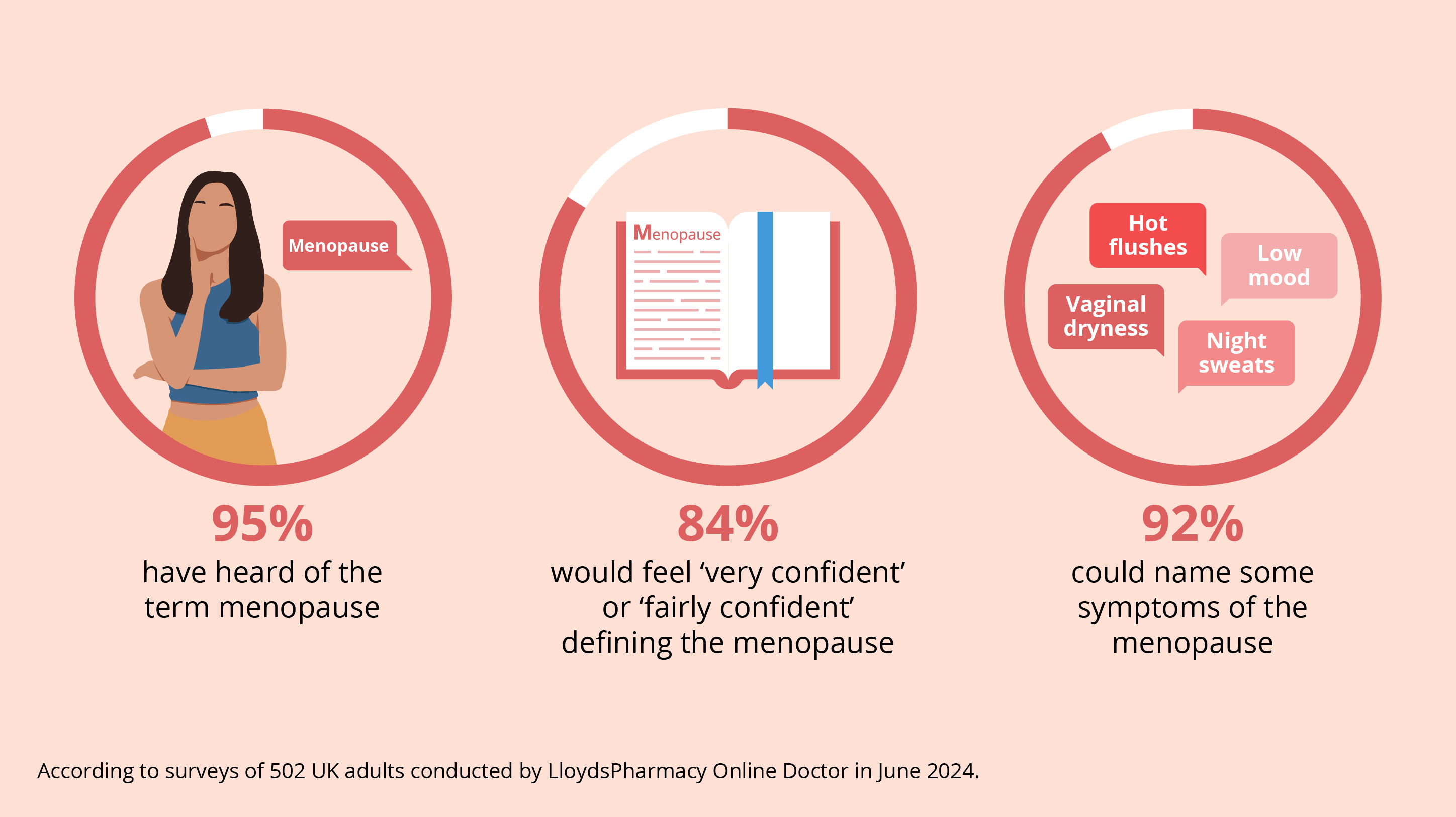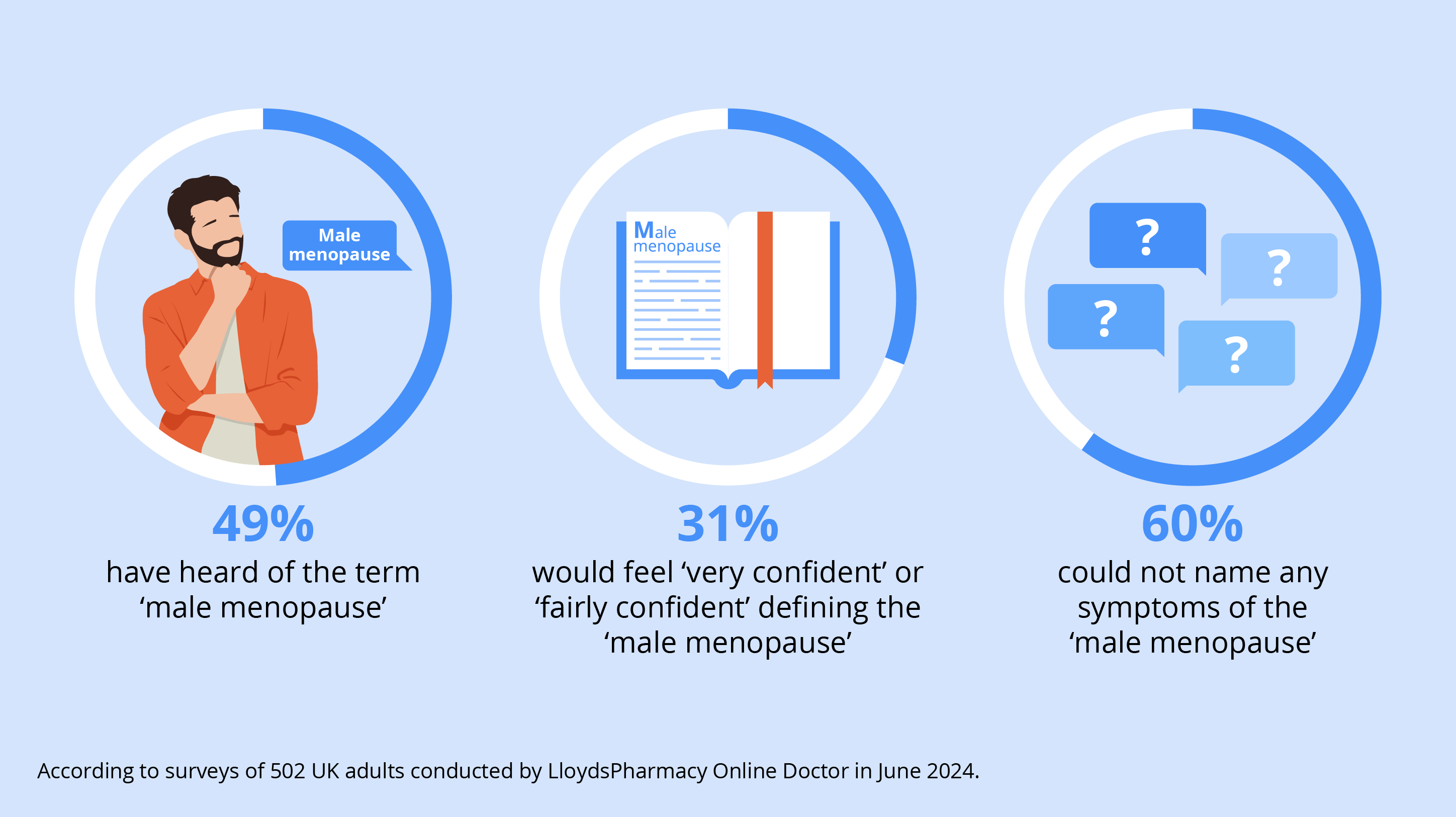How low testosterone impacts men
- How low testosterone compares to the menopause
- Other factors that contribute to low testosterone
- Common signs of low testosterone
- Why low testosterone can be hard to diagnose
- Treating and managing low testosterone
- Jeremy shares his experience of low testosterone
- How low testosterone can impact mental health
- How to support men experiencing low testosterone
Reviewed by Dr Bhavini Shah
The little-known condition affecting men’s mental, physical and sexual health.
In recent years, there has been a much-needed societal push to increase awareness and tackle the stigma surrounding menopause. However, as the conversation develops, we understand that it’s not just women that can be affected by fluctuating hormones.
There is also a change in hormone levels that sees some men’s mental, physical and sexual health affected. Is it time to raise awareness of low testosterone?
How low testosterone compares to the menopause
GP at LloydsPharmacy Online Doctor, Dr Bhavini Shah, explains what low testosterone is and how it differs from menopause.
The (female) menopause
“Menopause affects women and people who menstruate, occurring when a sudden drop in hormone levels causes menstrual periods to stop. It usually affects women between 45 and 55 but can happen earlier.
“There are over 30 recognised symptoms of menopause. Those impacting mental health can include anxiety, mood swings, and difficulty concentrating. Hot flushes, difficulty sleeping and changes in body shape are common physical symptoms.
“For women, symptoms of menopause can last for months or years, and some symptoms, such as joint pain, can continue after your periods have stopped.”
Low testosterone
"When some men reach their 40s or 50s, they experience mental and physical symptoms such as depression, loss of sex drive and erectile dysfunction. There is some overlap between symptoms of menopause and low testosterone - mood swings, difficulty sleeping and changes in body shape.
“The NHS discourage the use of the term “male menopause”. They say the term is unhelpful and misleading because it falsely suggests symptoms are the result of a sudden drop in testosterone in middle age.
“In reality, men experience a steady decline in testosterone. From around the age of 30 to 40, men’s testosterone levels reduce by about 1% each year.”
Other factors that contribute to low testosterone
Hypogonadism
“Hypogonadism is the medical term for testosterone deficiency which can impact men of any age. Low testosterone can be caused either by an issue in the testes themselves (where testosterone is produced) or the part of the brain that controls the function of the testes.”
Type 2 diabetes
“Health data suggests that there is a link between type 2 diabetes and low testosterone. NHS statistics indicate that around 16% of males with type 2 diabetes have lower-than-normal testosterone levels.”
Obesity
“Studies have demonstrated a link between obesity and low testosterone levels. In fact, it’s estimated that a one-point increase in BMI can lead to a 2% decrease in testosterone. Similarly, a four-inch increase in waist circumference is approximated to raise a man’s odds of having low testosterone by 75%.”
Common signs of low testosterone
“Low testosterone doesn’t always result in symptoms. However, there are a range of signs of low testosterone associated with low testosterone.”
- Mood swings and irritability
- Depression
- Loss of muscle mass and reduced ability to exercise
- Fat redistribution, such as developing a large belly or "man boobs" (gynaecomastia)
- A general lack of enthusiasm or energy
- Difficulty sleeping (insomnia) or increased tiredness
- Poor concentration and short-term memory
- Loss of sex drive
- Erectile dysfunction
Why low testosterone can be hard to diagnose
“Low testosterone can be hard to diagnose because low testosterone levels in men often go undiagnosed. Although testosterone levels can be easily checked by a blood test, tests aren’t routinely carried out.
“Plus the symptoms of low testosterone aren’t specific to the condition. Erectile dysfunction, low libido and mood swings, for example, may be the result of stress, anxiety or depression.
"But as these symptoms can interfere with everyday life and happiness, it is important to find the underlying cause and assess what can be done to resolve them.”
Treating and managing low testosterone
“If your own body does not make enough testosterone, testosterone replacement therapy (TRT) may be recommended. This can come in the form of injections or topical gels.”
NHS data indicates a growth in demand for TRT. Prescriptions for TRT increased 22% in 2023. In 2024, the NHS spent over £13.5 million on Testosterone.
“It’s worth noting that TRT isn’t just prescribed to men experiencing symptoms of low testosterone, it can also be recommended as a treatment for women who have a low sex drive during menopause, and trans men as part of their transition.
“Like most medications, TRT carries some risks. Side effects may include increased appetite, weight gain, acne, excessive sweating and mood changes.
“Taking testosterone can also thicken your blood, increasing your risk of heart attack, stroke and blood clots. It can also cause an enlarged prostate or other prostate disorders.
“TRT can also affect sperm production which could impact your fertility. If you are considering having children in the future, you should discuss this with your endocrinologist before starting treatment.”
The problem with non-prescription testosterone
“Due to risks associated with TRT, it’s important you only take testosterone prescribed by a doctor. Anabolic steroids or testosterone boosters are manufactured drugs that copy the effects of testosterone.
“There is a trend among gym-goers for taking this addictive, synthetic form of testosterone, believing they can increase muscle mass and decrease fat. But taking anabolic steroids carries serious health risks.
“It is illegal to sell testosterone without a prescription in the UK - and for good reason. The potentially life-threatening risks associated with taking testosterone mean it should only be prescribed by a doctor after careful consideration. Regular monitoring including blood testing is required to screen for adverse side effects.”
Jeremy shares his experience of low testosterone
54-year-old playwright Jeremy Kareken explains the physical and mental health problems he experienced as a result of low testosterone.
“I was in my late forties when I first started experiencing symptoms of low testosterone. Physically, I was experiencing fatigue, low sex drive, and weight gain. I was also feeling depressed and irritable, and sometimes I experienced brain fog. I hadn’t realised these symptoms were connected to low testosterone.
“My diagnosis came as I was being treated by a psychologist for anxiety and depression. He wanted to test my thyroid and testosterone levels before giving me any psychopharmaceuticals, and my blood tests came back with low testosterone results.
“The diagnosis made complete sense to me, as it explained a number of my symptoms: lack of interest in sex, slow recovery time in the gym, listlessness, even brain fog. After this, my doctor prescribed a testosterone gel, to be applied twice a day.
“Now, my mood is better, and I am more functional in my daily life. The testosterone replacement therapy kickstarted a number of other habits too: as I was seeing improvements in the gym, I would go more often, which led to me eating healthier.
“My advice to other men who think that they may also be experiencing low testosterone would be to get tested. There may be stigma with some men who feel that unexplained poor mood, inability to function at work, or lack of interest in sex are character flaws, but they might just be down to a simple hormone issue. I expect anyone who sees this as a switch that needs turning on, or a repair that needs making, will understand the practical results, and ignore the imaginary voices of their peers echoing social stigmas.”
How low testosterone can impact mental health
Psychotherapist specialising in men’s mental health, Asa Sanderson, explains how low testosterone impacts men.
How are testosterone and perceptions of masculinity linked and how can that affect men as they age?
“Testosterone and masculinity can be integral to both the way men perceive themselves and the way they feel others perceive them. These perceptions can impact men’s lives in different ways. For example how they interact socially, their romantic relationships, the family dynamic and in their career.
“This pressure to live up to people’s expectations can lead to some men trying to overcompensate outwardly whilst feeling lost internally.
“It’s common for men to create an identity they think people expect them to be; the leader, the tough guy, the alpha male, rather than to be the person they really are. To show vulnerability, weakness or for some people, to show a light-hearted, softer playful side goes against some societal expectations of a man.”
What can men do to promote good mental health as they age and experience falling testosterone levels?
“There are therapeutic options available to support men on their journey. One-to-one psychotherapy, small group therapy and coaching can help men work through the challenges they experience through ageing.
“Men can help themselves by developing an awareness and understanding of their own mental health needs through journaling, meditation and therapy.”
In addition, the following points can help to maintain mental health as men go through this process:
- Having a purpose
- Being a part of a community
- Regular social interaction
- Regular exercise
- Having responsibility
- Helping others
- Having a good self-care routine
- Having a support network
- Upholding boundaries
- Communicating effectively
How to support men experiencing low testosterone
Dan Somers, CEO & Founder of men’s mental health charity MANUP?, explains what friends and family can do to support men experiencing low testosterone.
How can we support men going through low testosterone?
“To support men with low testosterone, it's crucial to encourage a healthy lifestyle, including regular exercise, a balanced diet, and sufficient sleep. Additionally, fostering an environment where they feel safe to discuss their health openly can lead to better management through professional healthcare advice and potential treatments like hormone replacement therapy.”
Why can it be difficult for men to open up about low testosterone?
“Societal perceptions often equate masculinity with strength, resilience, and a high level of physical performance, which can make it challenging for men with declining testosterone to seek help. The stigma around hormonal health issues can lead to feelings of inadequacy or embarrassment, hindering open discussions or the pursuit of treatment. After all, some men might not know that this happens to a lot of men.”
The role of the workplace in supporting men through low testosterone
Neil McLeese from HR consultancy service, BeyondHR, explains how employers can support men who are struggling with symptoms of low testosterone.
The CIPD recommends treating the menopause as an occupational health and people management issue. However, is there currently any guidance for men experiencing low testosterone?
“Testosterone deficiency is not as commonly addressed in workplaces when compared to menopause which is recognised as a significant health issue for female employees. There are various reasons for this, perhaps most notable is the fact that menopause affects a substantial percentage of the workforce when compared to those affected by testosterone deficiency which is a much smaller number.
“Addressing testosterone deficiency and other men’s health issues is important for promoting employee health and wellbeing as well as productivity. Employers can help this by taking steps to raise awareness, supporting colleagues impacted by the condition and encouraging an open dialogue where employees feel comfortable discussing sensitive health issues.
"To help with physical symptoms such as fatigue and muscle weakness firms could consider introducing flexible working arrangements such as working from home as well as ergonomic adjustments including standing desks.
“Introducing general wellness initiatives that promote healthy lifestyle behaviours can help employees alleviate symptoms and improve general wellbeing.
“Under the Equality Act, employers are also required to provide reasonable accommodations for employees with medical conditions, including low testosterone. This can include flexible work arrangements, access to healthcare benefits as well as adjusting daily tasks as required.”
References
https://www.diabetes.co.uk/low-testosterone-and-diabetes.html
https://www.health.harvard.edu/mens-health/obesity-unhealthy-and-unmanly







